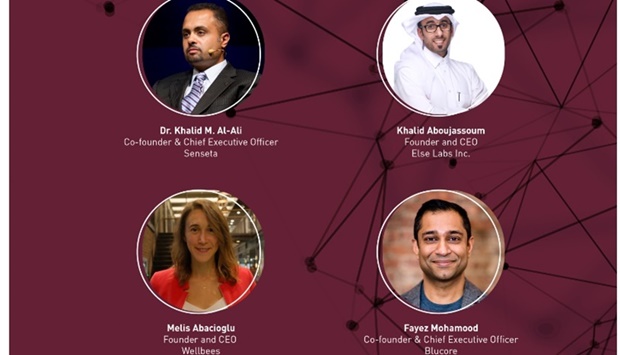Khalid Aboujassoum, founder and CEO of Else Labs Inc, made the statement during a webinar organised recently by Qatar Research, Development and Innovation (QRDI) Council under the title ‘Global Competition for Innovation Talent’.
Aboujassoum was joined by other prominent entrepreneurs, including Dr Khalid M al-Ali, co-founder and CEO of Senseta; Fayez Mohamood, co-founder and CEO of Bluecore; and Melis Abacioglu, founder and CEO of Wellbees.
The webinar is part of QRDI’s ‘The Spotlight On’ series, which aims to shed light on the successes, opportunities, and transformations of the innovation system both inside and outside of Qatar, according to the council’s earlier statement.
During the webinar, Aboujassoum said: “Qatar has a huge advantage to become a piloting hub. The size and diversity of the middle class in Qatar’s population is fantastic and very unique. And I think there is still a lot of untapped opportunities and potential that we can capitalise on, which I think is a shared responsibility.
“It is not a bad idea to start in Qatar and make it a jump-off point. It is actually realising your advantages and doubling down on that. Let Qatar be a piloting hub for global unicorns and I think we have that potential.”
Speaking on Qatar’s other strengths and advantages, al-Ali, on the other hand, said the country has built an “amazing ecosystem that is ripe for attracting the right talent,” citing Doha as a “unique” host of leading and “cutting-edge” academic institutions.
Qatar has eight Qatari educational institutions and is also home to as many as 18 foreign university campuses. Al-Ali said American universities in Qatar are offering “the same programmes of the graduating classes of their home campuses.”
“It’s the identical programme. They get the same degree and the same certificate that doesn’t say ‘Qatar’ on it, so as an employer in Qatar, I don’t have to compete with Facebook and Google to employ them because they are here.
“They’re not in the US but they are the same talent. Having worked in Silicon Valley and had recruited hundreds of people there, I can say that some of the smartest people I’ve met, I found them in Qatar – this is a validation that Qatar is onto something,” al-Ali explained.
Melis also noted that there is currently a “huge emigration” to countries in the Middle East and North Africa (Mena), such as the UAE and Qatar. “These two countries that we are targeting right now are trying to make themselves a home to people who want to emigrate and had emigrated there,” Melis pointed out.
She added: “They want to keep these talents, which is why I believe these countries are investing into different well-being opportunities to make employees feel that they’re not just a worker but they are also at home and are welcome to live there.”
Aboujassoum was joined by other prominent entrepreneurs, including Dr Khalid M al-Ali, co-founder and CEO of Senseta; Fayez Mohamood, co-founder and CEO of Bluecore; and Melis Abacioglu, founder and CEO of Wellbees.
The webinar is part of QRDI’s ‘The Spotlight On’ series, which aims to shed light on the successes, opportunities, and transformations of the innovation system both inside and outside of Qatar, according to the council’s earlier statement.
During the webinar, Aboujassoum said: “Qatar has a huge advantage to become a piloting hub. The size and diversity of the middle class in Qatar’s population is fantastic and very unique. And I think there is still a lot of untapped opportunities and potential that we can capitalise on, which I think is a shared responsibility.
“It is not a bad idea to start in Qatar and make it a jump-off point. It is actually realising your advantages and doubling down on that. Let Qatar be a piloting hub for global unicorns and I think we have that potential.”
Speaking on Qatar’s other strengths and advantages, al-Ali, on the other hand, said the country has built an “amazing ecosystem that is ripe for attracting the right talent,” citing Doha as a “unique” host of leading and “cutting-edge” academic institutions.
Qatar has eight Qatari educational institutions and is also home to as many as 18 foreign university campuses. Al-Ali said American universities in Qatar are offering “the same programmes of the graduating classes of their home campuses.”
“It’s the identical programme. They get the same degree and the same certificate that doesn’t say ‘Qatar’ on it, so as an employer in Qatar, I don’t have to compete with Facebook and Google to employ them because they are here.
“They’re not in the US but they are the same talent. Having worked in Silicon Valley and had recruited hundreds of people there, I can say that some of the smartest people I’ve met, I found them in Qatar – this is a validation that Qatar is onto something,” al-Ali explained.
Melis also noted that there is currently a “huge emigration” to countries in the Middle East and North Africa (Mena), such as the UAE and Qatar. “These two countries that we are targeting right now are trying to make themselves a home to people who want to emigrate and had emigrated there,” Melis pointed out.
She added: “They want to keep these talents, which is why I believe these countries are investing into different well-being opportunities to make employees feel that they’re not just a worker but they are also at home and are welcome to live there.”


